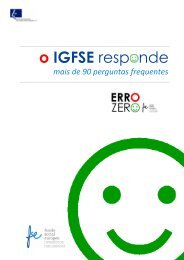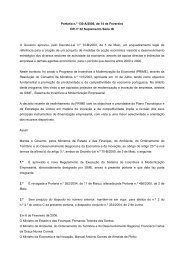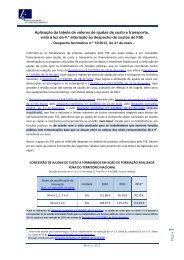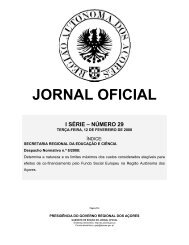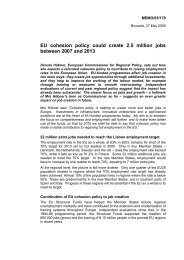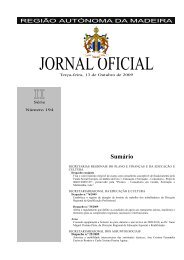Industrial Relations in Europe 2012 - European Commission - Europa
Industrial Relations in Europe 2012 - European Commission - Europa
Industrial Relations in Europe 2012 - European Commission - Europa
You also want an ePaper? Increase the reach of your titles
YUMPU automatically turns print PDFs into web optimized ePapers that Google loves.
Box 2.3 Cop<strong>in</strong>g with the economic crisis through social pacts<br />
Latvia (2008)<br />
S<strong>in</strong>ce 2004, the Latvian government avoided state budget discussions with the social<br />
partners, which culm<strong>in</strong>ated <strong>in</strong> union protests and public demonstrations <strong>in</strong> 2007. In the<br />
context of the start of the crisis and a worsen<strong>in</strong>g economic situation, negotiations at the<br />
National Tripartite Cooperation Council reconvened <strong>in</strong> 2008 to discuss the state budget for<br />
2009. Both employers and trade unions prepared and submitted to the government concrete<br />
proposals on how to improve the country’s economic and social situation. Despite protest<br />
campaigns, the government, the Latvia Employers’ Confederation (Latvijas Darba<br />
Devējukonfederācija, LDDK) and the Free Trade Union Confederation of Latvia (Latvijas<br />
Brīvo Arodbiedrībusavienība, LBAS) signed a tripartite agreement. This experience does not<br />
mean that tripartite negotiations will rema<strong>in</strong> a standard part of Latvian policymak<strong>in</strong>g, but it<br />
demonstrates that despite the government’s earlier reluctance to negotiate and ongo<strong>in</strong>g<br />
protests, social partners were able to engage <strong>in</strong> a constructive discussion and conclude a<br />
tripartite agreement.<br />
Estonia (2009)<br />
Representatives of several m<strong>in</strong>istries, the Estonian Trade Union Confederation (Eesti<br />
Ametiüh<strong>in</strong>gute Keskliit, EAKL) and the Estonian Employers’ Confederation (Eesti<br />
Tööandjate Keskliit, ETK) agreed on a pact address<strong>in</strong>g economic recession. The ma<strong>in</strong><br />
purpose of the agreement was to ma<strong>in</strong>ta<strong>in</strong> jobs and provide effective help for registered<br />
unemployed. After the pact’s conclusion, unemployment still kept ris<strong>in</strong>g, which forced the<br />
government to take further action. The M<strong>in</strong>istry of Social Affairs <strong>in</strong> cooperation with the<br />
Estonian Unemployment Insurance Fund <strong>in</strong>troduced a new national action plan for 2009–<br />
2010, aim<strong>in</strong>g at lower unemployment and support for the creation of new jobs. About €45<br />
million were assigned for an employment programme, which should help to create over<br />
5,000 jobs and boost the economy. This second plan was adopted with less <strong>in</strong>volvement of<br />
the social partners than the first agreement. Employers welcomed the plan but trade unions<br />
expressed some concerns on the possible misuse of subsidies by employers.<br />
Poland (2009)<br />
In March 2009, Polish peak national social partners reached an autonomous agreement on<br />
combat<strong>in</strong>g the negative effects of the economic slowdown. This agreement received a public<br />
praise and was considered a success of social dialogue. The social partners’ anti-crisis<br />
package was then presented to the government, which was to <strong>in</strong>corporate its provisions <strong>in</strong>to<br />
draft legislation and submit a legislative proposal to the parliament. In July 2009, the Polish<br />
parliament adopted the anti-crisis legislative package with some modifications to the general<br />
direction set out by the bipartite agreement reached by the social partners. Despite some<br />
critique by Solidarność, social partners accepted the outcome but cont<strong>in</strong>ued to exercise<br />
pressure on the government to <strong>in</strong>crease the efficiency of anti-crisis policy. The government<br />
acknowledged social partner claims and amended the anti-crisis legislation <strong>in</strong> October 2010.<br />
Changes <strong>in</strong>cluded lower<strong>in</strong>g the eligibility threshold for subsidiz<strong>in</strong>g the remuneration costs of<br />
part-time employees or employees that rema<strong>in</strong>ed idle due to a temporary crisis-<strong>in</strong>duced halt<br />
of their employer’s operation. This example documents that an <strong>in</strong>itially autonomous<br />
agreement can be upgraded to national legislation.<br />
Slovenia (2009)<br />
Public sector trade unions <strong>in</strong> Slovenia were engaged <strong>in</strong> br<strong>in</strong>g<strong>in</strong>g forth the government’s<br />
101



